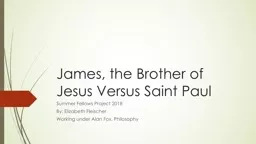PPT-James Marcia Identity status among
Author : tawny-fly | Published Date : 2019-11-27
James Marcia Identity status among young adults By Laura Binagia and JohnAnthony Harwerth Marcias Background Canadian developmental psychologist Professor emeritus
Presentation Embed Code
Download Presentation
Download Presentation The PPT/PDF document "James Marcia Identity status among" is the property of its rightful owner. Permission is granted to download and print the materials on this website for personal, non-commercial use only, and to display it on your personal computer provided you do not modify the materials and that you retain all copyright notices contained in the materials. By downloading content from our website, you accept the terms of this agreement.
James Marcia Identity status among: Transcript
Download Rules Of Document
"James Marcia Identity status among"The content belongs to its owner. You may download and print it for personal use, without modification, and keep all copyright notices. By downloading, you agree to these terms.
Related Documents














